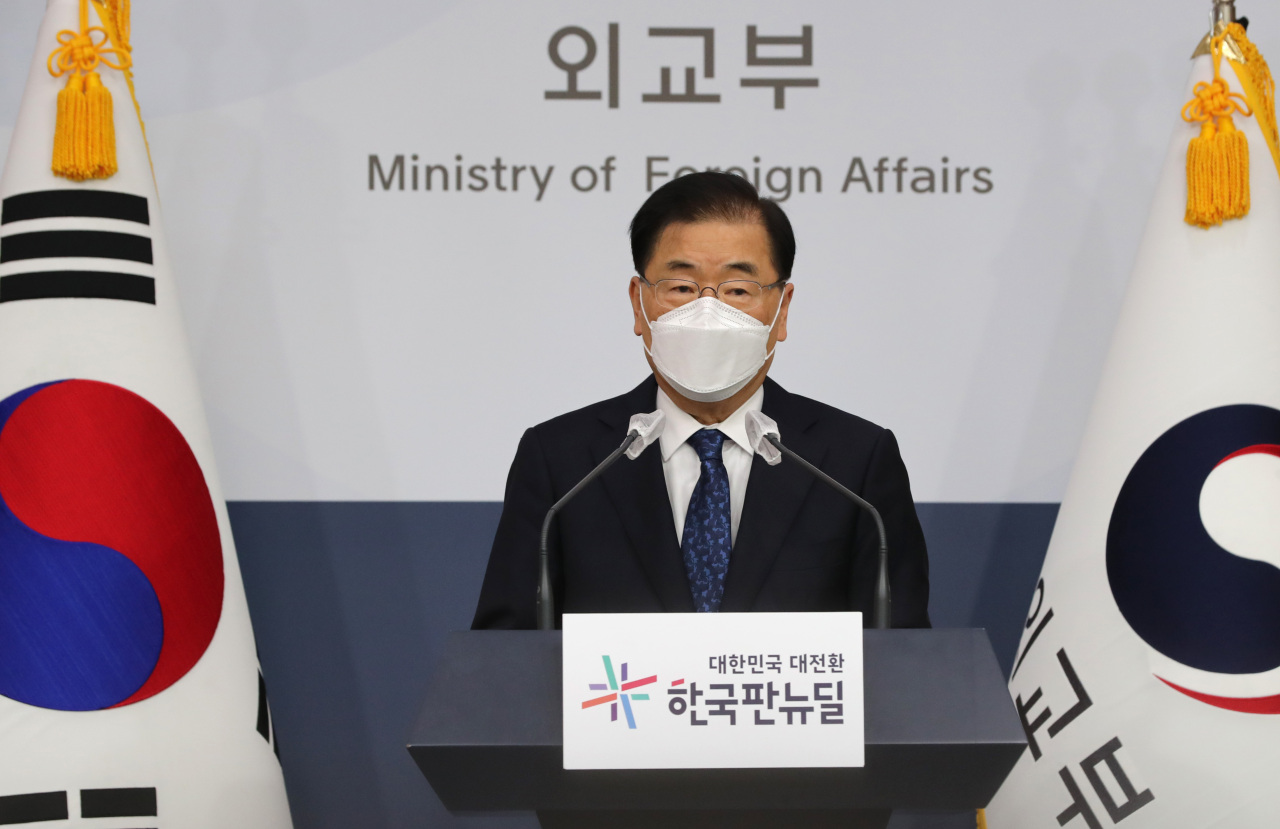Foreign minister calls for talks with Japanese counterpart
By Ahn Sung-miPublished : March 31, 2021 - 15:19

South Korean Foreign Minister Chung Eui-yong on Wednesday expressed hopes of meeting with his Japanese counterpart at an early date in an effort to repair bilateral ties that have long been strained over economic and historic disputes.
“Personally, I hope for the foreign ministerial talks between Korea and Japan to take place at an early date,” Chung told a press conference held at the Foreign Ministry, saying he was intent on meeting Japanese Foreign Minister Toshimitsu Motegi anywhere and in any format, whether in Seoul, Tokyo or elsewhere, and whether as part of a bilateral dialogue or trilateral talks with Washington.
Chung’s remarks come as Japan’s Kyodo News reported earlier this week that the top diplomats of South Korea, the US and Japan could hold talks in Washington in late April.
Stressing the efforts toward communication with Japan, Chung said Lee Sang-ryeol, the Foreign Ministry’s director general for Asia and Pacific affairs, had gone to Tokyo on Wednesday for talks with Japanese officials.
Since taking office last month, Chung has not yet had a phone call with Motegi, and there is speculation the apparent delay reflects tensions between the bickering neighbors. South Korea’s newly appointed ambassador to Japan, Kang Chang-il has yet to meet with the Japanese leader for similar reasons.
Seoul is seeking to defuse diplomatic tensions with Tokyo, which are rooted in Japan’s 1910-45 colonial rule of South Korea and have morphed into an ongoing economic feud. This comes as the Joe Biden administration pushes for tighter trilateral cooperation with its two Northeast Asian allies in the face of an assertive China and a defiant North Korea.
The national security advisers of the US, South Korea and Japan will meet in the US on Friday to discuss issues affecting the Korean Peninsula and may call for efforts to bolster trilateral ties.
Despite Seoul’s reconciliatory overtures, Chung said it will respond sternly to Tokyo’s distortion of history, including undue territorial claims over the Dokdo islets, reiterating the government’s “two-track approach” of dealing with historical issues and separately expanding exchanges in other areas.
In regards to Washington possibly mediating the Seoul-Tokyo tensions, Chung welcomed Washington’s cooperation to improve bilateral ties, but stressed it was fundamentally up to Seoul and Tokyo to resolve the situation.
Chung is set to visit China later this week to meet with Chinese Foreign Minister Wang Yi, amid growing speculation Beijing will pressure Seoul to take its side amid the intensifying rivalry between China and the US.
“US and China are not our subject of choice,” said Chung, stressing neither Washington nor Beijing had demanded Seoul make a choice between the two.
He underlined that both the US and China were important countries, with the US alliance being the “foundation of our diplomatic and security policy” and China being its closest neighbor and largest trading partner.
In regards to North Korea upping the ante with its recent ballistic missile launches, Chung expressed “deep regrets” and urged Pyongyang to comply with the agreement between the two Koreas for denuclearization on the Korean Peninsula and for peace.
Reiterating President Moon Jae-in’s call in declaring a formal end to the 1950-53 Korean War -- which ended with an armistice and not a peace treaty -- Chung expressed hope that such a declaration could resolve distrust and improve relations between Pyongyang and Washington.
“We understand that North Korea has great interest in (ending the Korean War), I hope Washington to consider the matter more positively,” he said.
Amid the deepening crisis in Myanmar after the military seized power in a coup in February and the violent suppression of pro-democracy demonstrations, Chung said Korea is considering imposing additional sanctions against the country if needed.
He also added that the government is ready to dispatch military aircraft or special planes to repatriate Korean citizens immediately if necessary.
By Ahn Sung-mi (sahn@heraldcorp.com)



![[Exclusive] Korean military set to ban iPhones over 'security' concerns](http://res.heraldm.com/phpwas/restmb_idxmake.php?idx=644&simg=/content/image/2024/04/23/20240423050599_0.jpg&u=20240423183955)




![[Pressure points] Leggings in public: Fashion statement or social faux pas?](http://res.heraldm.com/phpwas/restmb_idxmake.php?idx=644&simg=/content/image/2024/04/23/20240423050669_0.jpg&u=)

![[Herald Interview] 'Amid aging population, Korea to invite more young professionals from overseas'](http://res.heraldm.com/phpwas/restmb_idxmake.php?idx=644&simg=/content/image/2024/04/24/20240424050844_0.jpg&u=20240424200058)









